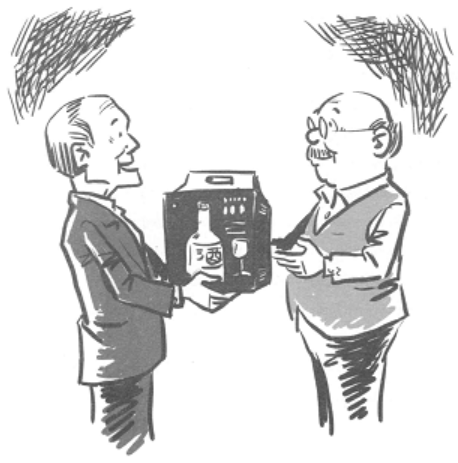In China, building a network is absolutely crucial for any kind of business success. Gift giving and gift exchanging is a key component in the building of networks. Unlike in the West, Chinese don't typically give chocolates, red wine, or flowers for gifts. Specialty food, hard alcohol, and cigarettes are the Chinese's gifts of choice to someone from whom a favor is needed.
By food, I don't mean home-baked cakes or cookies. Instead, I am talking about expensive delicacies that are regional and seasonal specific. For example, the fall is the hairy crab season in China. Since these crabs are only in season for a short time and are only produced in the area near Shanghai, they are a prized delicacy. Most people in China enjoy eating hairy crabs. Therefore, large and expensive hairy crabs make an ideal gift for an important person.
Another popular food gift during the mid-autumn festival is moon cakes. Mid-autumn festival occurs once a year on August 15th of the lunar calendar. So it usually falls somewhere in mid to late September on the solar calendar. It is traditionally a family holiday, similar to the American Thanksgiving, where everyone gets together for a family meal. In recent years, the mid-autumn festival has evolved into more of a commercial holiday where everyone exchanges moon cakes.
Moon cakes are round pastries that have a variety of fillings. Traditionally, they are sweet with lotus seed paste or red bean paste as fillings. These days, restaurants and bakeries make moon cakes to suit everyone's taste buds. You can buy salty Peking duck-filled moon cakes as well as ice-cream filled ones. They also make moon cakes that fit everyone's budget and gift-giving needs. The cheapest ones cost less than one US dollar apiece. But the expensive ones which might contain shark fin, birds' nest or abalone fillings can cost over several thousand US dollars per box. I was told some boxes are made of gold while others might contain a pair of ivory chopsticks.
While crabs and moon cakes are gifts suitable for everyone, expensive liquors and cigarettes are the typically gifts for Chinese men.
Unlike their Western counterparts who like to give bottles of red or white wine as gifts, the Chinese prefer hard liquors. In rural areas and small to medium-sized Chinese cities, people like to give Chinese-made grain alcohol or baijiu as gifts. The most famous brands are Wuliangye and Maotai. Similar to vodkas, these baijiu are very potent and contain 40% alcohol by volume.

Imported liquors in beautiful bottles also make excellent gifts in China. Remy Martin, Martell, Johnny Walker, Chivas and XO Cognacs are the most frequently preferred brands for gift exchange. Interestingly, the Chinese typically don't drink them. They tend to either put the bottle in a prominent display case or pass it on to others as a gift. I've often asked people why they don't drink the liquor. Most often people say that it is too expensive and too pretty a gift to consume. Putting a nice bottle of liquor on display shows friends and family that they are financially well-off and can afford expensive imported liquors.
Like liquors, cigarettes are also popular gifts for Chinese men. Most men in China smoke. In fact, in northern China there is a saying, "You are not a man if you don't smoke." But there are specific etiquette to follow when giving cigarette gifts.
First, the brand matters. The Chinese will give expensive brands for important occasions, and much less expensive ones for small matters. For example, the most popular cigarette for gift purposes is called Zhonghua, or China. It is a fairly expensive brand, ranging from $50 to almost $300 per carton. It is THE cigarette to give if you need to ask someone for a big favor. The Chinese say that "People who buy Zhonghua don't smoke it; people who smoke Zhonghua don't buy it." In other words, people who buy it cannot afford to smoke it themselves, but people who smoke it don't need to buy it themselves because they are so powerful that they always receive Zhonghua as gifts.
Second, when you give cigarettes, you must give two cartons of them. The Chinese believe even numbers are more auspicious, therefore it is good luck to give a pair of cigarette cartons as gifts. If you only give one carton, people will think that you are miserly and insincere.
In recent years, people are becoming more health conscious. In big cities, some people have become more hesitant about giving cigarettes as gifts. In order to mollify the negative effects of cigarettes, some will give a couple boxes of ginseng with the cigarettes. They hope that, this way, the healthy ginseng will cancel out the unhealthy cigarettes!
(selected from 101 Stories for Foreigners to Understand Chinese People by Yi S. Ellis and Bryan D. Ellis, published by China Intercontinental Press in 2012)